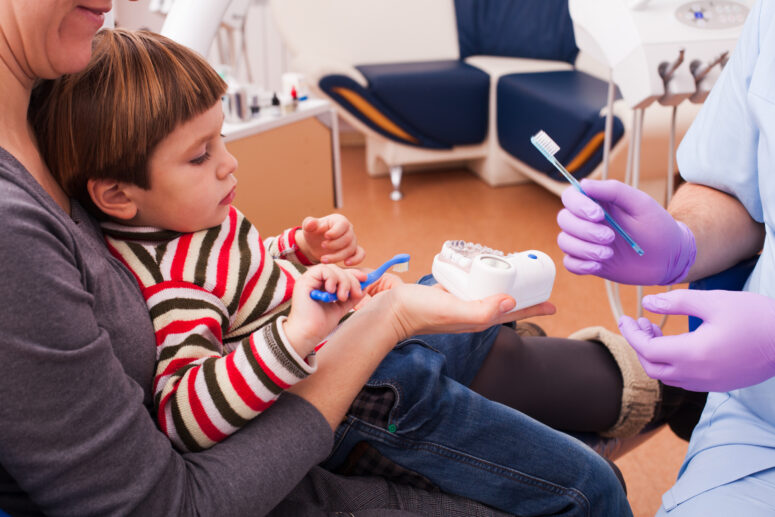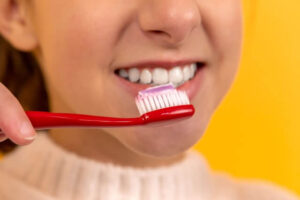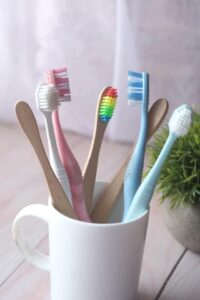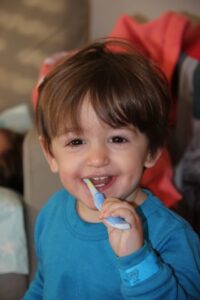
Table of Contents
Neurodivergent children, especially those with autism, can face a massive challenge when brushing their teeth and oral hygiene. Autistic children often feel sensations differently from other kids. As a result, the feeling of toothpaste foaming and bristles scrubbing over their teeth can be stressful.
Below, we’ll explore the challenges children with autism face when cleaning their teeth and ways of overcoming these challenges.
Why is Brushing Teeth a Challenge for a Child with Autism?
Children with autism can face challenges in many different aspects of life. Some children with autism may struggle in loud environments, while others may find social situations distressing. Another common struggle for children with autism is sensitivity.
Children diagnosed with autism can experience the sense of touch differently from other kids. As a result, some sensations, such as the feel of a toothbrush in your mouth, may feel different, causing the child to become anxious.
The feeling of having your teeth brushed is more than just the feeling of the brush rubbing against your teeth. You also have the strong flavor of the toothpaste as well as a foaming sensation. This can all be a little too much for children on the autistic spectrum, posing challenges when it comes to brushing your child with autism’s teeth.
Hyposensitivity or Hypersensitivity
70% of children with autism have sensory processing disorder (SPD), and as high as 95% of children on the autistic spectrum have atypical responsivity to sensations. In other words, most children with autism experience things like taste and touch differently.
Some children with autism have hyposensitivity, which means a reduced sense of feeling. This can result in a numb sensation, which is often confusing and uncomfortable. Causing your child anxiety about the brushing process.
Other children on the autistic spectrum have hypersensitivity. This leaves them with a heightened awareness of sensation. This can trigger overstimulation during brushing, which is unpleasant for your child. However, the process becomes less stressful when brushing is performed with care.
Tips for Brushing a Child with Autism’s Teeth
Brushing your child with autism’s teeth is an essential but often challenging task. As a result, many children with autism develop subpar oral hygiene, which can lead to issues later in life. To prevent this from happening to your child, you need to know a few hacks that make the process less challenging.
Remember these tips when it comes to brushing teeth for your child with autism:
- Choose a Suitable Toothbrush
- Get the Right Toothpaste
- Try to Floss
- Teach the Child How to Brush Their Own Teeth
- Use Incentives and Rewards
- Do It in a Comfortable Setting
See below for more information on the tips mentioned above.
Choose a Suitable Toothbrush
Not all toothbrushes are the same. Some toothbrushes have stiff bristles for removing plaque from teeth. While others have softer bristles to prevent damage to gums and to reduce the feeling for people with hypersensitivity. You may want to try various toothbrushes to find one that works for your child, but softer bristles are likely the better option.
Get the Right Toothpaste
The majority of toothpaste has a strong minty flavor and foams during the brushing process. Both of these sensations can cause your child discomfort. As a result, you should consider trying fluoride-free and unflavored toothpaste to eliminate the feeling causing them distress.
Try to Floss
Flossing is an essential step in a dental hygiene routine and prevents the development of gum disease. However, getting your children to floss can be challenging, especially when your child has hyposensitivity or hypersensitivity. So don’t stress if flossing is too much for your child, but it’s worth a try.
Teach Your Child How to Brush Their Own Teeth
Teaching and trusting your child to brush their own teeth is an excellent way of teaching independence. Independence is a brilliant motivator and can inspire your child to take care of oral hygiene. When your child is brushing their own teeth, it can also alleviate some of the associated anxiety as they are in control of the process.
Use Incentives and Rewards
Incentives and rewards are a great way to buy your child’s cooperation when brushing your child’s teeth. You could offer your child a treat, extra time to play games, or anything else that they love to do if they let you brush their teeth. Just remember that any incentives or rewards you offer will likely be expected after every tooth brushing.
Do It in a Comfortable Setting
Children on the autistic spectrum can find brushing their teeth uncomfortable and overwhelming. Therefore, if you want to make the process easier, you need to find ways to make the process more comfortable. One way of achieving this is by brushing their teeth in a more relaxed setting like your child’s bedroom.
Correct Way to Brush Teeth
There is a right and wrong way to do everything, including brushing your kid’s teeth. If you don’t follow the correct way of brushing, it’s likely that some teeth will be missed, or the entire cleaning process will take far too much time.
So, save yourself the time and hassle by following these steps;
- Starting with the top front teeth, brush the inside, outside, and chewing surfaces five times each
- Brush the bottom front teeth next, with five brushes on both the inside and outside of the teeth
- Then move to the bottom back teeth and perform five brushes on the inside, outside, and top of the teeth.
- Move up to the top back teeth next, again brushing the inside, outside, and chewing surface five times.
- Brush the top and bottom incisors five times on the inside and outside of each tooth.
- Lastly, give all the surfaces a quick once-over before rinsing with water or a mild mouthwash.
Toothpaste to Try
Multi-Sensory World: Unflavored Toothpaste is a toothpaste specially formulated for people who are sensitive to strong flavors. This product is also non-foaming, yet it still contains the recommended amount of fluoride to still be effective as a teeth cleaner.
Dr. Bob Unflavored Toothpaste is SLS-free (non-foaming), free from artificial flavorings, free from dyes, and free from strong flavors. This affordable toothpaste was designed for young children and for children with atypical sensitivity.
Jack N’ Jill Natural Kids Toothpaste is vegan toothpaste that contains zero fluorides. This toothpaste contains no harsh chemicals, gluten, or dairy and is made from natural ingredients. As a result, this toothpaste is even safe to swallow during brushing.
Toothbrushes for Autistic Kids
bA1 Sensory – 3-Sided Autism Toothbrush for Special Needs Kids is a soft brush clinically proven to make teeth cleaning more manageable and less stressful for autistic and special needs children. The brush achieves this by covering twice as much surface area with every stroke, drastically reducing the time needed to brush your child’s teeth.
Bright Autism Special Needs Toothbrush is a brush specially designed for children with sensitive gums. The bristles on this toothbrush curve across into an arch as opposed to sticking out straight from the brush. This reduces the sensation of brushing and can make a significant difference in brushing your kid’s teeth.
Happi Teeth 360 Degree Electric Toothbrush is an automatic toothbrush equipped with ultrasound brushing and thousands of bristles. The Happi Teeth brush also comes with sounds and a singalong voice to make the brushing engaging for children. To top it off, this toothbrush is shaped like a mouthguard, and it cleans all your teeth in under a minute with minimal effort.
Final Thoughts
Children with autism often have hyposensitivity (lack of stimulation), or hypersensitivity (too much stimulation), making oral hygiene a challenge. However, if you brush your autistic child’s teeth gently, follow the correct procedure, and implement some strategies like offering incentives, you can alleviate the anxiety associated with brushing your child’s teeth.
If you are ready to work with the best ABA therapy provider in New York, New Jersey or Indiana, give us a call at (732) 402-0297. Our dedicated team is ready to help and we will treat you like family.
- Interview with Kaitlyn Pietrobono - April 19, 2024
- Interview with Yakimah Lucas, BT - March 19, 2024
- Interview with Kimberly Woolery, BCBA - March 19, 2024



